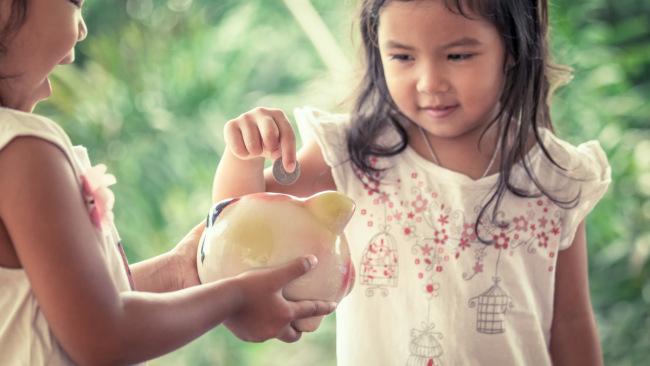Why your kids are never too young to learn about money
PARENTS are happy to talk to their kids about just about anything other than money. But there are plenty of good reasons why they should.

PARENTS are happy to talk to their kids about just about anything other than money. But there are plenty of good reasons why they should.
Kids are never too young to start learning about money and how to manage it.
But the subject still seems to be an awkward one for parents, long after the stigma of talking about sex, drugs and other serious topics has dissipated.
There is a cultural hesitance around talking about money with children, and worse, a lot of kids only hear money discussed in a negative way such as when there isn’t enough of it or when parents argue about bills and other financial matters.
A study by the Australian Security and Investments Commission found most couples (88 per cent) openly discuss their household finances with their partner. But, for those with children, only 15 per cent said they discussed finances with their children.
With cash becoming less prevalent and more transactions occurring electronically, however, there has arguably never been a more important time for all of us to start talking more openly about money.
And, according to ASIC’s Money Smart, if kids develop good financial skills from an early age they'll be ready for the financial challenges of adulthood.
Schools play a part by teaching skills to young kids such as how to self-regulate and recognising the difference between needs and wants. High school children learn more direct financial concepts like how to calculate compound interest.
Matthew Deeble, director of education support organisation Evidence for Learning says using pie charts, tokens or counters are good ways to explain the relative cost or value of all the things around you that kids mostly take for granted.
“For example if Mum and Dad earn 10 tokens a week, four tokens are spent on paying for the house, one goes toward food etc,” Deeble says. “In the early years mathematics is a fundamental building block so building good maths concepts – a sense of your units, your tens, your hundreds are good ways to ultimately come back and think about the intersection (with money).”
Delayed gratification is also something that can be taught from a young age. Offer kids a reward for being helpful with a lolly straight away or tell them, if they wait until the end of the day, they can have two lollies. As they become more aware of the value of money you can explain that they can spend their money all in one go or save it up until they have more and can buy something they really want.
Pocket money for chores is a good way to make maths real. You can discuss how your child will use that pocket money, how to split it between what they’re saving for, what they’ll spend now and work out how long it will take to save up for a certain thing, says Deeble.
Earning different amounts for different jobs starts to teach relativity of value.
“For the older kids you can reinforce what’s being taught in school about values (relative values of goods and services) and things like tax and compound interest so they become effective financial consumers themselves,” says Deeble.
The ATM is a good place to teach kids about money.
While it seems like a magical machine that spurts out never ending cash, you can explain to the children that it is like a big money box that minds the money that you work hard to earn. Whenever you take money out, there is less in that money box.
Rakesh Gupta from Griffith University says as a society we speak about money in a negative way rather than in a positive way and this sends the wrong messages to children.
“We talk about money with kids all the time, we talk about when kids overspend on their mobile phone bills but we don’t involve them in our money decisions so how can they learn how to be responsible with money?”
He says whether it is the Christmas shopping or going on a family holiday, tell the kids how much you have in your budget and get them to help you buy the presents on the list for that price or find a holiday that everyone will enjoy for the cost of the money you have saved.
“We all have budgets but rather than it being a negative experience, get them to think about how they can use that budget. Young kids are so good at working these problems out and will often have better ideas about what to do with that money than their parents.”
Originally published as Why your kids are never too young to learn about money


